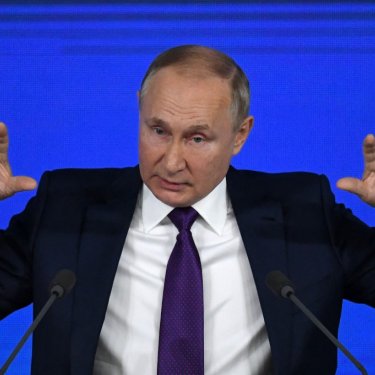War in Ukraine: Putin delivers the final blow to Russia’s independent media

Reporters Without Borders (RSF) calls on the Russian authorities to immediately repeal a draconian law adopted on 4 March that makes the publication of “false” or “mendacious” information about the Russian armed forces punishable by up to 15 years in prison. It leaves little hope for the future of the country’s few remaining independent media outlets.
Читать на русском / Read in Russian
Many leading foreign media – including the BBC, CNN, Bloomberg News, ABC, CBS News and Canada’s CBC/Radio-Canada – have decided to temporarily suspend broadcasting or news gathering in Russia since the amendment, which applies to foreign as well as Russian citizens, was signed into law by Vladimir Putin.
The leading Russian investigative newspaper Novaya Gazeta also announced on 4 March that it was removing all of its articles about the war in Ukraine because Russian military censorship is “rapidly entering a new phase” and it “doesn’t have the right to endanger the freedom” of its journalists. The business news website The Bell also announced that its decision to stop covering the war in Ukraine in order to protect its journalists from criminal prosecution.
“We are looking on helplessly as Russia’s independent media are being silenced to death,” said Jeanne Cavelier, the head of RSF’s Eastern Europe and Central Asia desk. “With this new amendment, putting journalists in Russia at risk of significant criminal penalties, Vladimir Putin has delivered the final blow and completed the destruction of Russia’s independent media, which had already been considerably weakened by the foreign agents law enacted at the end of 2017. We call on the Russian authorities to repeal this draconian law at once.”
Radio Echo of Moscow, Russia’s leading independent radio broadcaster, had announced on 3 March that it was ceasing broadcast and shutting down its website and social media accounts. Dozhd TV stopped broadcasting soon afterwards and other media outlets quickly followed suit later the same day. The news website Znak also announced that it was shutting down, The Village closed its Russia bureau, and Radio Serebrianny Dozhd cancelled most of its programmes, replacing them with music and the repeated message: “We cannot speak, we don’t want to lie.”
Around 30 Russia and Ukraine websites blocked
Through its media regulator Roskomnadzor – which is on RSF’s list of digital press freedom predators – the Russian government has been stepping up its harassment of independent media outlets ever since the start of the invasion of Ukraine. Russian media were immediately ordered to use only “information and data from official Russia sources” and to use the term “special operation” to refer to the invasion, or risk being shut down.
In the space of a week, Roskomnadzor has blocked around 30 Russian and Ukrainian independent media sites. The latest targets are the BBC’s Russian-language news service, the German public radio and TV broadcaster Deutsche Welle, Radio Svoboda – the Russian subsidiary of the Prague-based US broadcaster Radio Free Europe/Radio Liberty (RFE/RL) – and the independent Russian site Meduza. The remaining unblocked independent media outlets – Mediazona, Novaya Gazeta, Svobodnaya Pressa, Journalist and Lenizdat – are likely to be blocked soon.
To combat the blocking of independent media outlets in Russia, RSF has relaunched its Operation #CollateralFreedom, which uses mirror site technology to enable news websites to circumvent censorship.
Russia is ranked 150th out of 180 countries in RSF's 2021 World Press Freedom Index.



